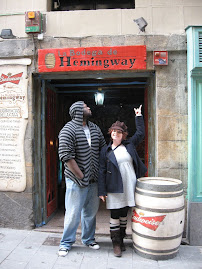In Brenda Jo Brueggemann's "Interpreting Women," she discusses how the construction of moral character or ethos influences the "rhetorical triangle" between the speaker, hearing-impaired "listener," and signer. However, what is particularly relevant here is Brueggemann's discussion of ethics and authority--for Brueggemann the ethics of the interpreter, in my research, the ethics of the parent or advocate "speaking" on behalf of the autistic.
Brueggemann notes: "First, there is the way that an ethics of care and ethics of justice occur in often-entangled operations with each other" (Brueggemann 68). Brueggemann describes a challenges faced by interpreters in regard to the "dimensions of, and boundaries around, their service to and representation of their d/Deaf clients" and how those concerns govern "their collective and individual views of care and justice" and how that "impacts their way of doing their job" (Brueggemann 68).
A second issue she addresses in regard to the "interpretive authority dynamics" is how "complex representation issues are encountered repeatedly by sign language interpreters," particularly when the deaf person is a "power-under situation"--as in a medical scene. Such instances are "microcosms of the way power plays out at large in our culture" (Brueggemann 69). Brueggemann argues, "The complex of representational issues that sign language interpreters encounter in their authoritative 'speaking' space need to be even more carefully coded, catalogued, and categorized so that interpreters in training and practice might have better frames within which to understand their own authority" (69).
Another issue: The "representational dilemmas that sign language interpreters often encounter, that are also often complementary and competing at the same time, are their ethical conflicts about their own positions as mere instruments or powerful advocates" (Brueggemann 70). Brueggemann discusses the ethical concerns in regard to sign language but I think her concerns likewise apply to issues related to representation and autism (parental advocacy, ABA, assisted communication): "Is an interpreter merely a kind of communicative conduit? Are they a unique form of access technology? And (or?) are they real people and an active, engaged part of the dia-no, make that tria-logue?" (Brueggemann 70).
A final point that is important for autism and representation: Interpreters "are deeply involved in the politics of translation. In exploring the always shifting standpoint of an interpretative triangle, they must turn to issues of translation, transliteration, and communicative and crosscultural (mis)understandings in general. Sign language interpreters by and large have a discomforting awareness that too much depends on upon them, that hearing people often only have conversations with them (not with the deaf person they are interpreting for), that their authority is simply too great, that the balance of communication is off-kilter to begin with and the triangle askew, near to collapsing" (Brueggemann 71).
Finally, Brueggemann concludes with a statement about "willing speech" that seems particularly relevant for autism issues, especially considering how difficult speech--communication--can be for the autistic: "What strikes me here then, and finally, is how the power of willing speech --of speech that is one's will, of speech that is easy and willing , of the ability to will speech to occur--is no authority to be ignored. [...] The authority of [...interpreters] represents perhaps one of the keenest examples we could imagine of rhetoric's long-standing educational, political, and personal power--the endowment of willing speech" (Brueggemann 71).
Tuesday, July 3, 2007
Subscribe to:
Post Comments (Atom)








No comments:
Post a Comment